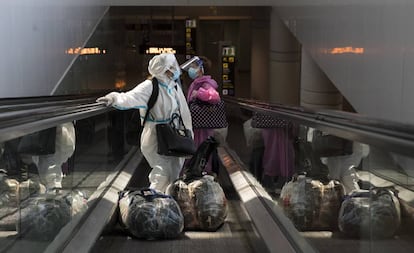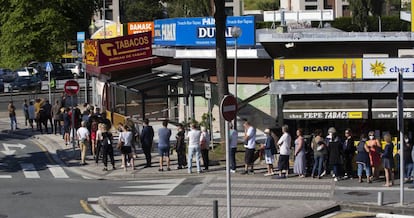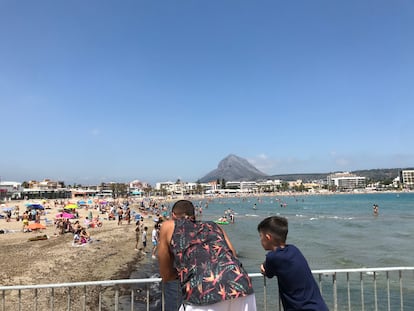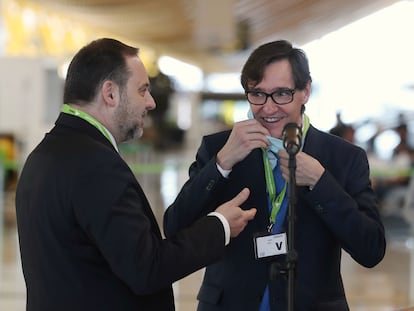Crowded beaches and lines for tobacco: What day one of Spain’s ‘new normality’ looked like on Sunday
The country emerged from the state of alarm yesterday after nearly 100 days, with flights restarting, people traveling to their second homes, and play parks reopening
Spain was plunged into the so-called “new normality” on Sunday, after nearly 100 days under a state of alarm due to the coronavirus crisis. Subject to temperature checks, the obligatory use of masks, and supplied with liters and liters of hand sanitizer, passengers on a hundred or so flights landed in Spain from Schengen-area countries, with a total of 225 routes restarting – a low number compared to a normal month of June.

El Prat airport in Barcelona, for example, was operating at 5% of capacity yesterday. The majority of arrivals were foreigners who work in Spain and who left the country during the lockdown. There were few tourists to be seen. Cristhie Mcfett is from South Africa and has worked in Barcelona “in the digital music industry” for the last two years. “When the pandemic was declared I came home, but now that the situation there is worse, I have come back to carry on working,” she explained.
Spain’s border with France opened on Sunday – the frontier with Portugal remains closed – and from the start of the day lines formed in Behobia, Irún, where French citizens were waiting to buy cheap tobacco, cosmetics and Spanish ham. “It’s been 90 days since I smoked,” joked one young Frenchman on Sunday, who had been paying double for cigarettes during the lockdown given the higher taxes paid on the product in France.

Plenty of bathers came to the beaches of Cádiz, in southern Spain, where people had to be turned away in order to avoid overcrowding. Bolonia beach, in Tarifa, for example, was faced with the difficult combination of more bathers, lower capacity, and the same amount of sand as always, which is also subject to rising and falling tides. As a result, many of the access points to the beaches across the province had to be shut to avoid overcrowding.
The lifting of the state of alarm – which means that citizens can move freely across the entire Spanish territory for the first time since March 14 – was noted in tourist zones such as Xàbia, in the eastern Mediterranean province of Alicante, where thousands of people have second residences. The arrival of tourists there was met with a mixture of relief – given the effect it will have on the local economy – and apprehension, due to the risk of new coronavirus outbreaks. “We’re calling on people to use common sense to avoid risky situations,” said the mayor of Xàbia, José Chulvi. “We trust that everyone will act responsibly, we are not going to be marking out spaces on beaches,” he added, in reference to the social-distancing measures that are being introduced in some of Spain’s coastline.

The country’s children, who were subject to one of the strictest lockdowns in the world at the start of the state of alarm, were greeted by the sight of play parks open for business once more, with the police tape being removed from swings and slides in cities such as Barcelona, Valencia, A Coruña and Madrid. Seville and Bilbao will follow suit during the week. The authorities are trusting parents to clean their children’s hands with sanitizer after they play in the parks, and for social distancing to be observed – not an easy task when it comes to the younger boys and girls.
With reporting by Jesús A. Cañas, Pedro Gorospe, Ignacio Zafra, Javier Martín-Arroyo.









































